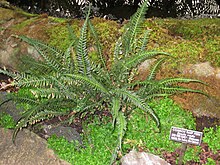|
Doodia media
Doodia media, also known as rasp fern (or pukupuku in Māori),[2] is a fern species in the family Blechnaceae. The species was formally described by botanist Robert Brown in 1810.[3][4] Distribution of the species includes New Zealand's North Island and the upper part of the South Island (Nelson and Marlborough).[2] It is also found in Australia and Lord Howe Island.[5]  Young fronds contain flavonoids that protect them from ultraviolet radiation and give them a pink colour.[2] Phylogenic studies have shown that the genus Doodia is embedded within the paraphyletic genus Blechnum,[6] when that genus is broadly circumscribed. Christenhusz et al., 2011, therefore reassigned all Doodia species to Blechnum. Doodia media R.Br. was transferred to Blechnum medium and Doodia media subsp. australis (Doodia australis) was transferred to Blechnum parrisii.[7] Other sources, such as World Ferns, based on the Pteridophyte Phylogeny Group classification, split Blechnum, accepting Doodia.[1] References
Wikispecies has information related to Doodia media. Wikimedia Commons has media related to Doodia media.
|
||||||||||||||||||||||||||||||||
